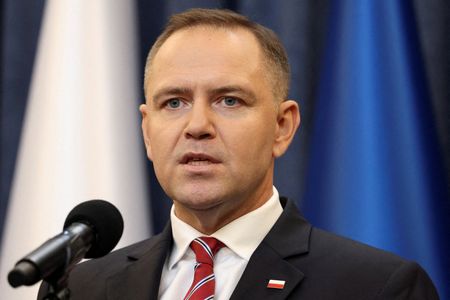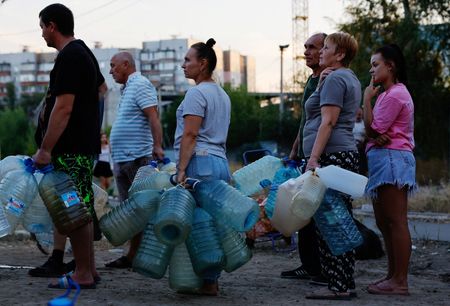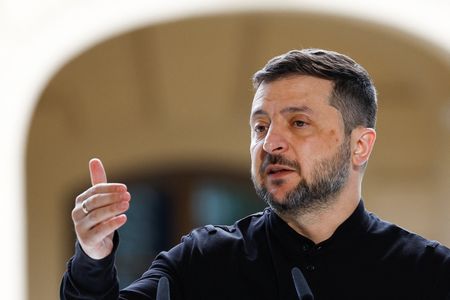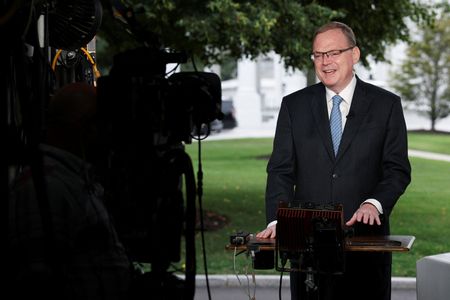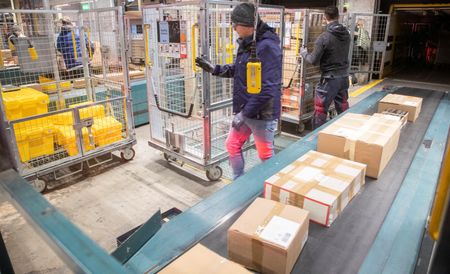WARSAW (Reuters) -Ukraine’s access to Elon Musk’s satellite internet service Starlink could be cut due to the Polish president’s veto of a refugee aid bill, a Polish deputy prime minister said on Monday, as a conflict between the government and head of state deepens.
Poland pays for Ukraine to use Starlink, which provides crucial internet connectivity to the country and its military as they try to push back invading Russian forces.
Polish President Karol Nawrocki on Monday vetoed a bill extending state financial support provided to Ukrainian refugees and unveiled plans to limit their future access to child benefits and healthcare.
However, Deputy Prime Minister and Digital Affairs Minister Krzystof Gawkowski said the vetoed legislation also provided the legal basis for providing Starlink to Ukraine.
“This is the end of Starlink internet, which Poland provides to Ukraine as it wages war,” he wrote on X.
A digital affairs ministry spokesperson said Nawrocki’s veto meant that from October 1 there would be no legal basis for paying for Starlink. Nawrocki’s spokesperson told Reuters the basis for paying for Starlinks could still be restored if the parliament adopts the bill proposed by the president by the end of next month.
Poland has been one of Ukraine’s staunchest backers since Russia invaded in 2022. Both the centrist government of Prime Minister Donald Tusk and Nawrocki, a conservative nationalist, agree on the need to help Ukraine resist Russia’s invasion but some Poles have grown weary of helping to support an estimated 1.5 million Ukrainians currently living in Poland.
Nawrocki, inspired by U.S. President Donald Trump, promised during his election campaign this year to put “Poles first” and to limit the rights of foreigners in Poland.
“I did not change my opinion and I intend to fulfil my obligations and I believe that (family) benefit should only be granted to those Ukrainians who make the effort to work in Poland, the same with healthcare,” he told journalists.
Ukraine’s Foreign Ministry did not immediately reply to a request for comment.
Ukrainian refugees are currently eligible to receive the monthly family benefit of 800 zlotys ($219) per child if their children attend Polish schools. Other EU countries such as Germany have also proposed cutting benefits recently.
In Poland, the president can propose bills and veto government legislation. The government can similarly block the president’s proposals.
HISTORICAL STRAINS
Nawrocki also proposed on Monday tightening the criminal code to ban the promotion of Stepan Bandera, a Ukrainian nationalist leader who fought both Nazi and Soviet forces during World War Two, and his insurgent army.
“I believe this bill should clearly address Bandera and equate the Bandera symbol in the criminal code with symbols corresponding to German National Socialism, commonly known as Nazism, and Soviet communism,” Nawrocki said.
Many Ukrainians regard Bandera and his militia as heroes for the resistance they mounted against the Soviet Union and as symbols of Kyiv’s painful struggle for independence from Moscow.
But he is remembered by many in Poland as a symbol of anti-Polish violence. Bandera is associated with the Ukrainian Insurgent Army (UPA), which Warsaw says carried out mass killings of Polish civilians in 1943-44. Thousands of Ukrainians also died in reprisal killings.
Publicly promoting Nazi, fascist or communist ideas is subject to up to 3 years of prison under the Polish criminal code.
($1 = 3.6456 zlotys)
(Reporting by Anna Wlodarczak-Semczuk, Pawel Florkiewicz and Barbara Erling; Additional reporting by Anastasiia Malenko in Kyiv; Editing by Gareth Jones)

